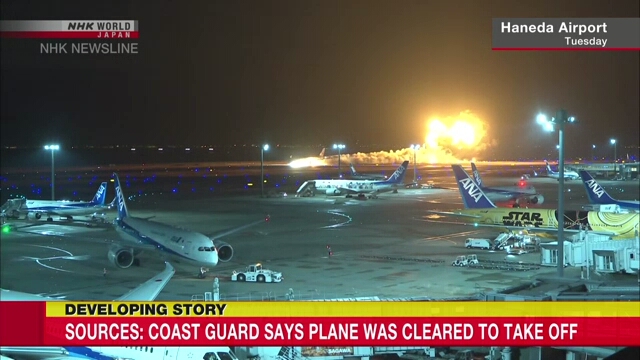Knew it pretty much had to be this or the controller forgetting they had cleared a jet onto the runway (Los Angeles runway disaster). Less likely the incoming jet landing on the wrong one.
Controller error would maybe be easier to determine a full root cause, very sad for everyone on the coast guard aircraft though.
The Live ATC archive sounds like the controller said “taxi to holding position Charlie 5”. With no explicit “hold short runway 34R” there no transcripts yet, and we don’t know what the coast guard confirmation response was to the command, but the tower command seems ambiguous at best. It’s pretty hard to pick out but the tower call is at about 15:10 in this archive https://archive.liveatc.net/rjtt/RJTT-Twr-TCA-Jan-02-2024-0830Z.mp3
Taxi to holding position is standard ICAO phraseology, they should have been off the runway at C5. Line up and wait would have them on the runway.
US uses different phraseology.
Interesting, we the same sort of language as the US up here in Canada too, but I always assumed it was the same thing the world over. Is there a website or handbook containing ICAO standard language available somewhere? I’m curious what other differences there are
ICAO PANS ATM Doc 4444
It has actually been a cause of runway incursions by US-trained aircrew in the past.
That makes a lot of sense, because like I said in another comment, I’d be more likely to interpret that as “taxi into [takeoff] position and hold”, not “taxi to threshold.” Hopefully the change that comes of this is US/Canadian aviation starts using the ICAO standard phraseology.
While I do think this is a good idea, I don’t think it can be attributed as a factor in the accident. The captain of the Japanese Coast Guard had nearly 5 years under his belt and was likely much more familiar with ICAO phraseology than what is used in North America.
You’re probably right, I’m being too quick to jump to conclusions.
As an aside, I find it a little ironic that most of the world follows ICAO phraseology, yet Canada, home to ICAO’s headquarters, does not.
Thank you for pointing this out.
I had also looked into it in more detail, and came to the same conclusion. In the ICAO quick reference guide they provide an almost identical example:
Taxi to holding point C, runway 27, Big Jet 345
I’ve clarified this in my analysis.
The official transcript was shared in a press conference:
[ATC] JA722A Tokyo Tower. Good evening. No.1, taxi to holding point C-5.
[JA722A] Taxi to holding point C-5, JA722A No.1. Thank you.
I’ve put together a detailed write-up here.
I couldn’t make sense of anything in that recording, but if you’re right about the tower call, then that sounds a lot more like “taxi into position and hold” than “taxi and hold short of runway.”
It’s actually pretty impressive that there weren’t more lives lost. The whole situation sucks and should’ve been avoided, but once it happened, I’m surprised it was “just” five
It’s a testament to safety standards in new planes. The A350 has tons of fire safety implemented and I believe is actually one of the first ones to have this amount of safeguards against fires spreading quickly.
Yeah only the Coasties lost anyone, surprised all passengers made it off of the air bus with the way that fireball went up.





